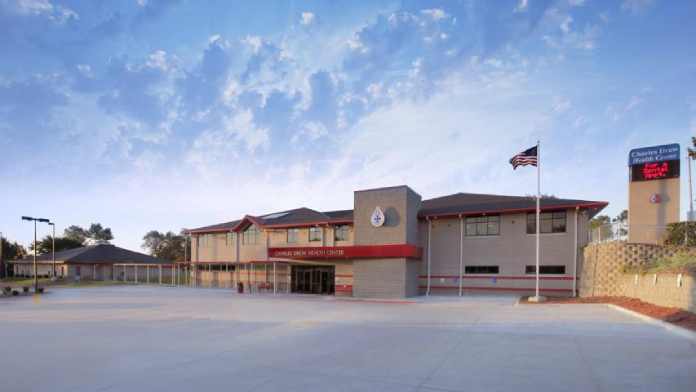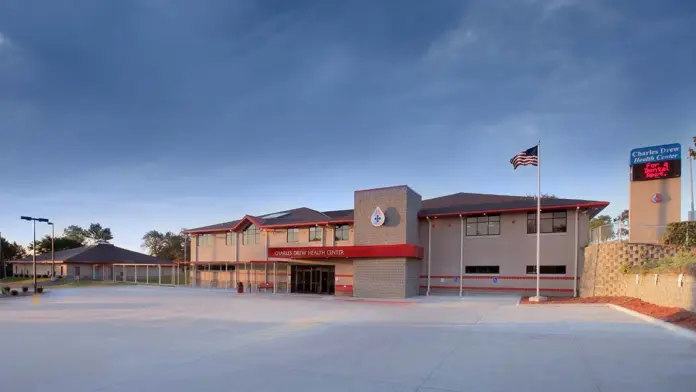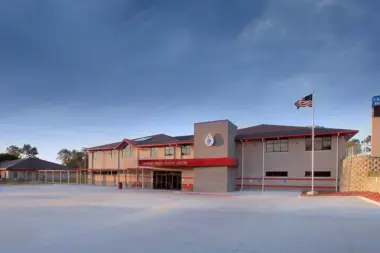Friendliness, reliability and good service are the main characteristics of this center, they really helped me to deal with my problems when I needed it most, the staff was very good. I will definitely return to this place if I need medical services.
About Charles Drew Health Center, Inc.
Charles Drew Health Center is an integrated and Joint Commission accredited health care network providing accessible and personalized care to North Omaha communities in Nebraska. They strive towards enhanced quality of life among residents via quality and compassionate care that strengthens families while supporting patients’ dignity. They eliminate financial and location barriers to quality care through low cost programs that are delivered within the community. This community focused approach ensures you can tap into your natural support like family and friends as you navigate recovery close to home.
You’ll not be denied care due to your inability to pay. They accept Medicaid and Medicare alongside several private insurance plans and offer sliding scale payments if you’re uninsured. Services are delivered in the language you’re most comfortable with thanks to their free, on-site interpretation and translation services. Charles Drew Health Center has about 30 clinics across North Omaha in Douglas County.
Their main campus on Grant Street offers primary medical care, dental services and behavioral health including mental healthcare and substance use issues. This center also provides pharmaceutical services and adolescent health education. They’re located just off 30th and Grant Streets near Highway 75 with direct routes to downtown Omaha which is about a 10-minute drive. The facility also serves patients from Council Bluffs, Bellevue and Lincoln.
Personalized Care for a Healthier Future
The Charles Drew Health Center offers holistic outpatient treatment for people dealing with moderate mental health issues and substance use disorders. Holistic care fosters general wellness of the body, mind and spirit. They offer referral support for more serious behavioral health issues requiring intense therapy.
Outpatient substance use care in this facility involves diagnostic evaluation to facilitate personalized care planning. This is followed by therapy using proven methods to help you break unhealthy patterns of thinking that fuel substance dependence. This is all while building coping skills to prevent relapse.
Therapy may include group and individual sessions with family involvement emphasized as necessary. You may even attend sessions virtually in your own comfort zone via a secured video conferencing platform. They offer trauma-informed care to help people address past trauma that may fuel substance dependence.
Unique Programs Beyond Drug and Alcohol Addiction
The facility also supports folks struggling with quitting smoking or chewing tobacco and provides services for those in the criminal justice system. Their adolescent services include testing and low-cost treatment for STDs including free rapid-result HIV testing. They also offer contraceptive or birth control services.
Latest Reviews
Rehab Score
Gallery




Other Forms of Payment
Private insurance refers to any kind of healthcare coverage that isn't from the state or federal government. This includes individual and family plans offered by an employer or purchased from the Insurance Marketplace. Every plan will have different requirements and out of pocket costs so be sure to get the full details before you start treatment.
Self-pay involves paying for treatment out of your own pocket. You can use savings or credit, get a personal loan, or receive help from family and friends to fund your treatment. If you don't have insurance or your insurance plan doesn't cover a specific program, self-pay can help ensure you still get the care you need.
Financial aid can take many forms. Centers may have grants or scholarships available to clients who meet eligibility requirements. Programs that receive SAMHSA grants may have financial aid available for those who need treatment as well. Grants and scholarships can help you pai for treatment without having to repay.
Sliding scale payments are based on a client's income and family size. The goal is to make treatment affordable to everyone. By taking these factors into account, addiction recovery care providers help ensure that your treatment does not become a financial burden to you or your family, eliminating one barrier to care.
Medicare is a federal program that provides health insurance for those 65 and older. It also serves people under 65 with chronic and disabling health challenges. To use Medicare for addiction treatment you need to find a program that accepts Medicare and is in network with your plan. Out of pocket costs and preauthorization requirements vary, so always check with your provider.
Military members, veterans, and eligible dependents have access to specific insurance programs that help them get the care they need. TRICARE and VA insurance can help you access low cost or no cost addiction and mental health treatment. Programs that accept military insurance often have targeted treatment focused on the unique challenges military members, veterans, and their families face.
Medicaid is a state based program that helps lower-income individuals and families pay for healthcare. Medicaid covers addiction treatment so those enrolled can use their coverage to pay for rehab. When a program accepts Medicaid the client often pays very little or nothing out of their own pocket.
Addiction Treatments
Levels of Care
Outpatient Programs (OP) are for those seeking mental rehab or drug rehab, but who also stay at home every night. The main difference between outpatient treatment (OP) and intensive outpatient treatment (IOP) lies in the amount of hours the patient spends at the facility. Most of the time an outpatient program is designed for someone who has completed an inpatient stay and is looking to continue their growth in recovery. Outpatient is not meant to be the starting point, it is commonly referred to as aftercare.
When loved ones stage a drug intervention in Nebraska, the goal is not to gang up on the individual and make them feel attacked. The aim is to make them feel cared for and to present a solid plan for getting them the treatment they need. This process often includes intervention services. These professionals can provide support for planning and carrying out the intervention and guidance for appropriate treatment for the individual and family members.
Treatments
Mental health rehabs focus on helping individuals recover from mental illnesses like bipolar disorder, clinical depression, anxiety disorders, schizophrenia, and more. Mental health professionals at these facilities are trained to understand and treat mental health issues, both in individual and group settings.
Programs
Adult rehab programs include therapies tailored to each client's specific needs, goals, and recovery progress. They are tailored to the specific challenges adult clients may face, including family and work pressures and commitments. From inpatient and residential treatment to various levels of outpatient services, there are many options available. Some facilities also help adults work through co-occurring conditions, like anxiety, that can accompany addiction.
Young adulthood can be an exciting, yet difficult, time of transition. Individuals in their late teens to mid-20s face unique stressors related to school, jobs, families, and social circles, which can lead to a rise in substance use. Rehab centers with dedicated young adult programs will include activities and amenities that cater to this age group, with an emphasis on specialized counseling, peer socialization, and ongoing aftercare.
Clinical Services
Cognitive Behavioral Therapy (CBT) is a therapy modality that focuses on the relationship between one's thoughts, feelings, and behaviors. It is used to establish and allow for healthy responses to thoughts and feelings (instead of unhealthy responses, like using drugs or alcohol). CBT has been proven effective for recovering addicts of all kinds, and is used to strengthen a patient's own self-awareness and ability to self-regulate. CBT allows individuals to monitor their own emotional state, become more adept at communicating with others, and manage stress without needing to engage in substance abuse.
Group therapy is any therapeutic work that happens in a group (not one-on-one). There are a number of different group therapy modalities, including support groups, experiential therapy, psycho-education, and more. Group therapy involves treatment as well as processing interaction between group members.
In individual therapy, a patient meets one-on-one with a trained psychologist or counselor. Therapy is a pivotal part of effective substance abuse treatment, as it often covers root causes of addiction, including challenges faced by the patient in their social, family, and work/school life.
Trauma therapy addresses traumatic incidents from a client's past that are likely affecting their present-day experience. Trauma is often one of the primary triggers and potential causes of addiction, and can stem from child sexual abuse, domestic violence, having a parent with a mental illness, losing one or both parents at a young age, teenage or adult sexual assault, or any number of other factors. The purpose of trauma therapy is to allow a patient to process trauma and move through and past it, with the help of trained and compassionate mental health professionals.
Whether a marriage or other committed relationship, an intimate partnership is one of the most important aspects of a person's life. Drug and alcohol addiction affects both members of a couple in deep and meaningful ways, as does rehab and recovery. Couples therapy and other couples-focused treatment programs are significant parts of exploring triggers of addiction, as well as learning how to build healthy patterns to support ongoing sobriety.
Research clearly demonstrates that recovery is far more successful and sustainable when loved ones like family members participate in rehab and substance abuse treatment. Genetic factors may be at play when it comes to drug and alcohol addiction, as well as mental health issues. Family dynamics often play a critical role in addiction triggers, and if properly educated, family members can be a strong source of support when it comes to rehabilitation.
Staff & Accreditations
Staff

Kenny D. McMorris, MPA, FACHE, CHCEF
CEO

Eric Sherman, MD, MPH
Chief Medical Officer

Tasha Conley, MSN, RN
Director of Nursing

Ginny Czechut, MSPR
Development Director

Larry Duncan, LIMHP, LPC, LADC
Development Director

Kathryn Hajj, MD
Quality, Risk Management and Compliance Director

Shayla Pierce
Human Resources Director

Ann Smolsky, MA
COO
Accreditations

The Joint Commission, formerly known as JCAHO, is a nonprofit organization that accredits rehab organizations and programs. Founded in 1951, the Joint Commision's mission is to improve the quality of patient care and demonstrating the quality of patient care.
Joint Commission Accreditation: Yes
Contact Information
2915 Grant St
Omaha, NE 68111